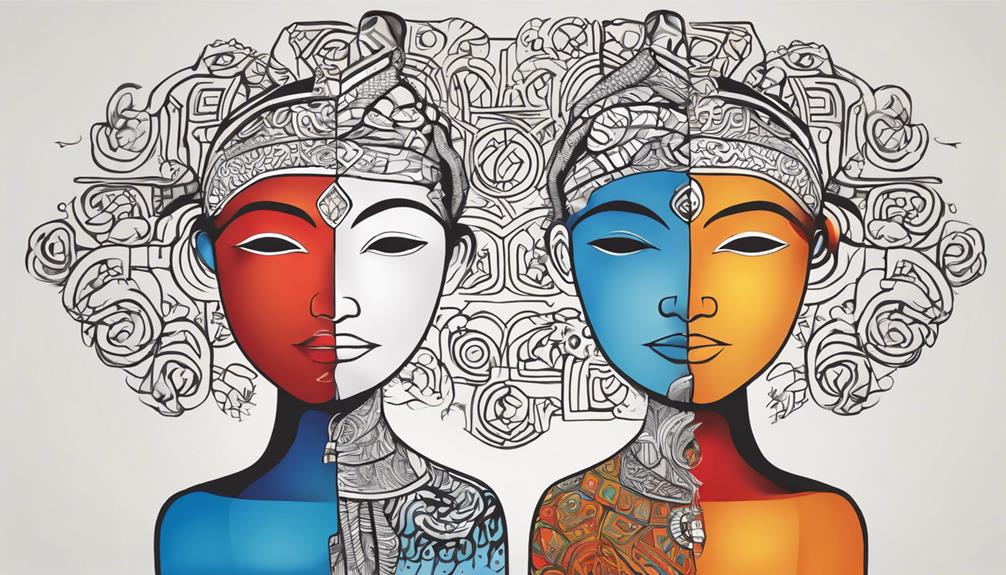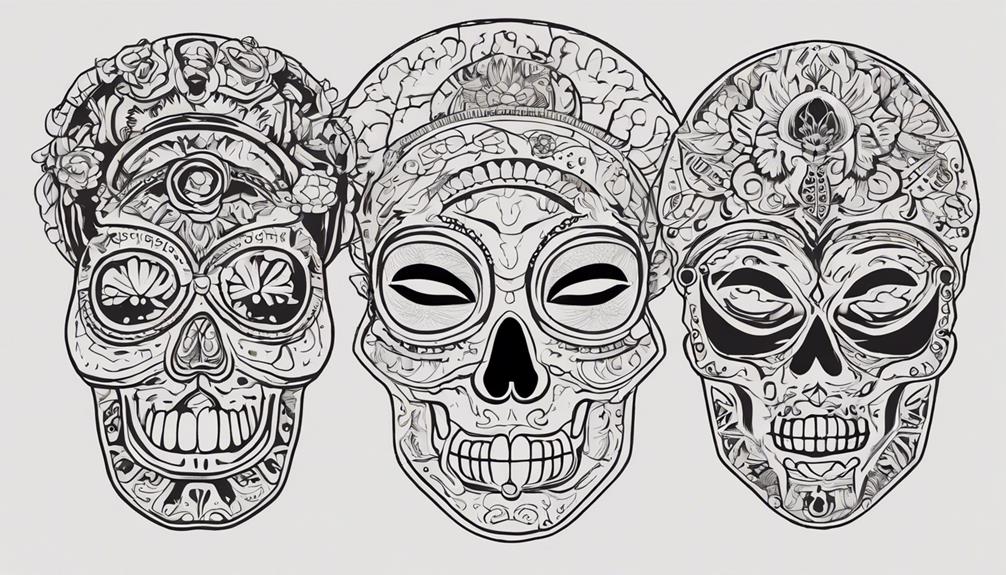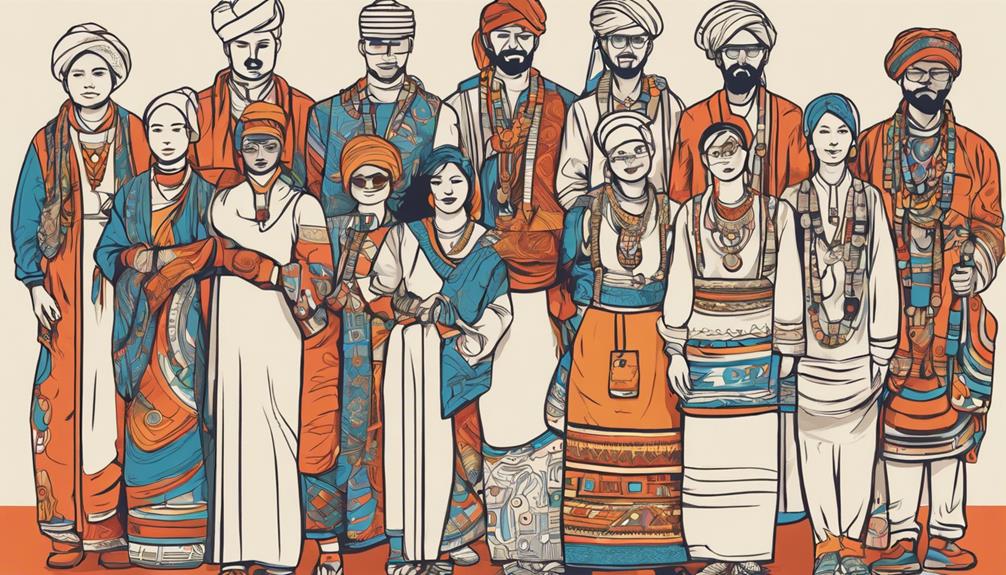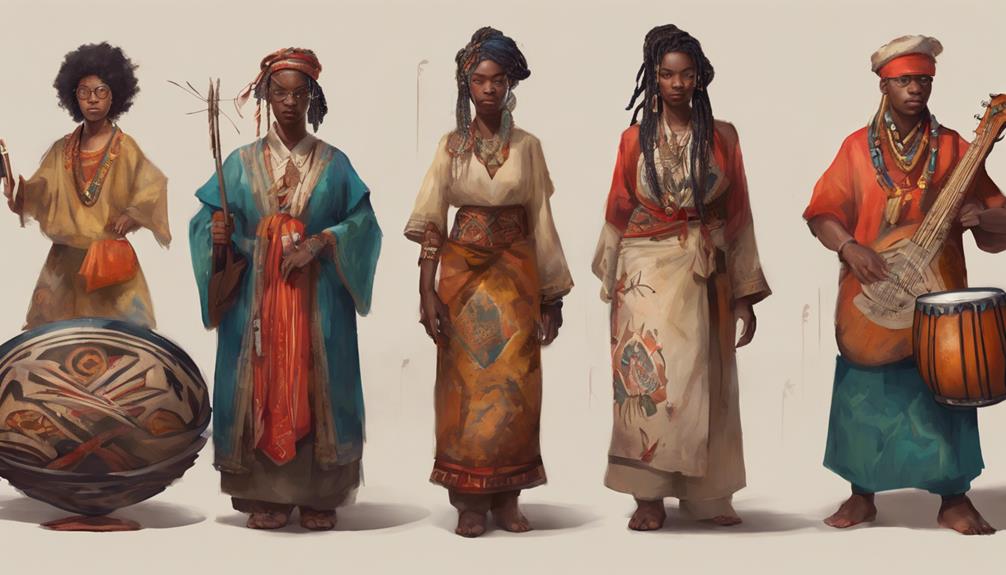The intricate tapestry of human cultures across the globe offers a fascinating study in diversity and uniqueness. What lies at the core of each culture's distinctiveness? It is a complex interplay of historical legacies, societal norms, linguistic nuances, and deeply ingrained traditions that mold the collective identity of a cultural group. As we unravel the layers that define cultural uniqueness, we are confronted with a myriad of factors that shape the beliefs, values, and behaviors of individuals within these societies. The exploration of what truly sets each culture apart invites us to delve deeper into the essence of humanity's rich tapestry of diversity.
Key Takeaways
- Cultural diversity showcases rich tapestry of traditions and customs.
- Traditional expressions reflect beliefs, values, and artistic creativity.
- Cultural practices shape societal interactions and communication dynamics.
- Culinary and festive culture offer insights into traditions and flavors, reflecting cultural uniqueness.
Understanding Cultural Diversity

Understanding the intricacies of cultural diversity is paramount in fostering a comprehensive appreciation for the myriad customs, beliefs, and values that shape societies worldwide. Cultural differences, stemming from unique historical, social, and environmental factors, contribute to the diverse tapestry of human civilization. People's cultural orientation, influenced by their upbringing, education, and societal norms, plays a crucial role in shaping their perceptions and behaviors. Recognizing and respecting these variations in cultural orientation is essential for promoting harmonious interactions among individuals and communities.
Unique Cultural Traditions
Various cultures around the world boast unique traditions that reflect their beliefs and values. From intricate festive rituals to distinctive culinary delights, these customs offer insights into the artistic expressions and societal norms of different societies. Exploring these practices sheds light on the rich tapestry of human culture and the diverse ways in which communities express their identities.
Festive Rituals
In different cultures around the world, festive rituals encompass a diverse array of unique and intriguing traditions that reflect the depth of cultural beliefs and practices. These customs are deeply rooted in the cultural fabric of societies and often carry significant meanings. For instance, in Greece, throwing baby teeth onto roofs is believed to bring good luck to the child. In Hungarian culture, refraining from clinking glasses during toasts is a sign of respect. South Korean tradition advises against using red ink when writing names due to its association with death. Egyptians avoid asking for salt at the dining table because of superstitions. Similarly, in Russian customs, gifting yellow and red flowers is avoided. Each of these festive rituals provides a window into the values and beliefs of these unique cultures.
Culinary Delights
Culinary delights across diverse cultures serve as a gateway to understanding the intricate tapestry of traditions and flavors interwoven within societies worldwide. From the delicate art of sushi-making in Japan to Italy's rich pasta varieties like spaghetti and lasagna, culinary traditions offer insights into cultural aspects. Mexico's vibrant cuisine, featuring tacos and mole sauce, reflects a fusion of indigenous and Spanish influences. India's diverse culinary landscape showcases flavorful curries and biryanis, blending spices and cooking styles from different regions. France's renowned pastries such as croissants and macarons display precision and artistry in every bite. Each culture's culinary heritage not only tantalizes the taste buds but also tells a story of history, influences, and innovation through food.
Artistic Expressions
Artistic expressions within different cultures serve as profound reflections of societal values and beliefs, showcasing a unique blend of tradition, creativity, and symbolism. Chinese calligraphy demonstrates elegance and precision in brush strokes, reflecting a deep respect for history and tradition. Maori tattoos, or ta moko, are not just designs but symbols of cultural identity and genealogy, embodying the essence of the Maori people. Japanese tea ceremonies, known as chanoyu, emphasize harmony, respect, purity, and tranquility in every ritual, highlighting the importance of mindfulness and tradition. Indian rangoli art bursts with vibrant colors, creating intricate patterns that adorn floors during festivals, symbolizing joy and celebration. Aboriginal dot painting in Australia tells stories, connects to the land, and conveys spiritual beliefs through meticulous dot patterns, reinforcing the rich cultural heritage of Indigenous Australians.
Impact of Cultural Values
Cultural values play a fundamental role in shaping societal norms and influencing individual behaviors. These core beliefs guide decision-making processes and influence attitudes towards various aspects of life. Understanding the impact of cultural values is crucial for fostering cross-cultural understanding and promoting diversity in a global context.
Core Cultural Beliefs
Core cultural beliefs, deeply ingrained within societies, exert a profound influence on decision-making processes and behaviors. These values serve as the guiding principles that shape individual and collective actions. National cultural differences are evident in contrasting approaches to societal issues, such as individualism versus collectivism and attitudes towards time. Understanding these core cultural beliefs is crucial for comprehending the norms and behaviors within a society. The table below provides a comparison of how cultural values influence different aspects of life across various national cultures.
| Aspect | Cultural Values Impact |
|---|---|
| Decision-making processes | Foundation for choices and actions |
| Resource allocation | Shapes distribution strategies and priorities |
| Interpersonal relationships | Defines social interactions and expectations |
| Organizational culture | Guides behaviors and performance within institutions |
Social Norms Influence
Social norms are intricately woven manifestations of cultural values that govern behavior and interactions within societies, shaping the fabric of individual conduct. These norms influence how individuals make decisions, interact with one another, and navigate various social contexts. Cultural values act as the guiding principles behind these social norms, determining what behaviors are deemed acceptable and expected within a particular culture. From etiquette to traditions, the impact of cultural values on social norms is evident in the unique customs observed in different societies. Furthermore, cultural values play a crucial role in shaping social hierarchies, defining relationships, and influencing communication patterns within a community. Understanding the influence of cultural values on social norms is essential for effectively engaging in social interactions and building relationships across diverse cultures.
Cultural Influences on Society

Shaping societal norms, values, and behaviors, cultural influences are fundamental in guiding interactions and decision-making processes. Culture, deeply rooted in different countries, plays a crucial role in shaping societies worldwide. Language, a key cultural element, facilitates the transmission of cultural values, impacting communication patterns and understanding among individuals. Furthermore, traditions and customs are integral to upholding cultural identities, passing down rituals and practices through generations, thereby reinforcing the cultural fabric of a society.
Cultural perceptions significantly influence how individuals perceive the world, affecting their behaviors and social interactions. Understanding cultural cues and differences is essential for fostering cross-cultural sensitivity and developing effective communication strategies. By recognizing and respecting cultural influences, individuals can navigate diverse social landscapes with greater understanding and harmony. Embracing the multifaceted nature of cultural influences on society enriches interactions and promotes intercultural collaboration, ultimately contributing to a more interconnected and inclusive global community.
National Cultural Contrasts
Highlighting the divergence in national cultural practices and norms can provide valuable insights into the complexities of global interactions and communication dynamics. Understanding different cultural traditions is crucial for effective cross-cultural communication. A comparison of various national cultural contrasts reveals interesting insights into the unique norms and practices that shape societies worldwide.
| Cultural Contrast | Cultural Practice |
|---|---|
| Venezuelan vs. American/German/South Korean/Japanese | Attitudes towards punctuality vary, with Venezuelans favoring slight lateness and the latter valuing punctuality. |
| Chinese | Gifting etiquette involves avoiding white flowers, clocks, handkerchiefs, and umbrellas. |
| Norwegian | Emphasizes using utensils for all meals as essential table manners. |
| Bolivian | Considering it rude to discuss business during social occasions. |
| Australian | Tradition of sitting in the front with taxi drivers. |
Celebrating Cultural Uniqueness

In examining the rich tapestry of global cultures, it becomes evident that celebrating cultural uniqueness is a fundamental pillar in fostering cross-cultural understanding and appreciation.
- Each culture's uniqueness is reflected in its specific traditions, customs, and rituals, shaping their identity.
- Cultural uniqueness is evident in the diverse languages, cuisines, art forms, and music styles that each culture embraces.
- Celebrating cultural uniqueness involves recognizing the distinct values, beliefs, and societal norms that define a particular culture.
- Cultural uniqueness is showcased through various festivals, ceremonies, and celebrations that highlight the heritage and history of a community.
- Embracing and respecting cultural uniqueness fosters cross-cultural understanding, appreciation, and harmony among different societies.
Recognizing and celebrating diverse cultural practices and societal norms not only enriches individual experiences but also contributes to a more tolerant and inclusive global society. By acknowledging and valuing these differences, we can create a world where cultural diversity is not only celebrated but also serves as a unifying force that promotes mutual respect and understanding.
Frequently Asked Questions
What Makes Different Cultures Unique?
Cultural traditions and societal norms are the foundations that contribute to the uniqueness of different cultures. These elements encompass a wide array of practices, beliefs, and customs that shape the way individuals within a society interact and behave. From gift-giving customs to social etiquette, each culture's distinct set of norms and traditions reflects its historical, geographical, and social influences, ultimately defining its identity and individuality.
What Is Different About Each Culture?
Cultural traditions and societal norms define the distinct characteristics of each culture. From gift-giving customs in Russia, China, and Egypt to unique practices like tossing baby teeth in Greece and avoiding clinking glasses in Hungary, these traditions offer insight into the values and beliefs of a community. Understanding these cultural nuances illuminates the rich tapestry of diversity that exists across the globe, fostering appreciation and respect for different ways of life.
What Is the Cultural Uniqueness?
Cultural traditions encompass a wide array of practices and beliefs that are unique to specific societies. These customs often reflect the values and history of a culture, shaping societal norms and behaviors. From rituals like tossing baby teeth for luck to gifting taboos involving flower colors, each culture's distinctiveness is rooted in its traditions and social customs. Understanding these aspects can provide valuable insights into the complexities and diversity of human societies.
What Makes up a Persons Unique Culture?
A person's unique culture is primarily shaped by their language and traditions. Language serves as a tool for communication and a vehicle for cultural transmission, influencing thought patterns and social interactions. Traditions, on the other hand, encompass rituals, customs, and behaviors passed down through generations, embodying the essence of a cultural identity. Together, language and traditions form the cornerstone of an individual's unique cultural makeup, reflecting their heritage and societal connections.
Conclusion
In conclusion, the diversity of cultures is a tapestry woven from a myriad of unique threads, each contributing to the rich and vibrant mosaic of human society. Cultural traditions, values, and influences shape the identity of a society, creating a kaleidoscope of perspectives and behaviors. Embracing cultural uniqueness is like adding spice to life, enriching our understanding of the world and fostering appreciation for the variety of human experiences.
